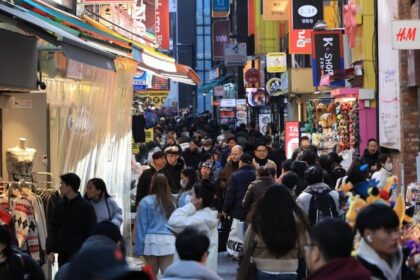Train Photographers Arrested for Shoplifting at Osaka Expo
Six young men from Tokyo, all members of a train photography enthusiast group known as “toritetsu,” were arrested in Osaka for orchestrating a large-scale shoplifting operation at the 2025 Osaka-Kansai World Expo. Their actions have sparked widespread criticism and reignited debate about the darker side of Japan’s train photography subculture, as well as concerns about event security and the reputation of major international gatherings.
- Train Photographers Arrested for Shoplifting at Osaka Expo
- What Happened at the Osaka Expo?
- Who Are the “Toritetsu”?
- The 2025 Osaka-Kansai World Expo: A Global Stage
- The Broader Context: Crime, Reselling, and Subculture
- Understanding the Appeal and Risks of Train Photography
- Lessons from Pop Culture: Shoplifting and Public Perception
- In Summary
What Happened at the Osaka Expo?
The incident unfolded at the highly anticipated 2025 Osaka-Kansai World Expo, an event expected to draw over 28 million visitors from around the world. The six suspects, all in their early twenties, traveled from Tokyo to Osaka by Shinkansen (bullet train), but instead of purchasing the full fare, they bought only the minimum ticket necessary to enter the train gates. They then coordinated their movements to evade conductors and avoid paying the full price for the journey—a practice known as fare evasion.
Upon arrival in Osaka, the group entered the Expo grounds using discounted student tickets, despite not being eligible for the discount. Their plan was meticulously timed: they specifically targeted a day when new children’s clothing stock arrived at Expo shops, aiming to maximize the resale value of their haul.
Inside the Expo, the group shoplifted a total of 111 items, including a wide range of souvenirs and newly stocked merchandise, with a total value of approximately 410,000 yen (about US$2,800). They stashed the stolen goods in lockers on-site, returning multiple times to steal more items before eventually attempting to leave with their loot.
Their suspicious behavior did not go unnoticed. A vigilant customer reported them to Expo staff, who then contacted the Osaka Prefectural Police. The group was apprehended and arrested, bringing their crime spree to an abrupt end.
Who Are the “Toritetsu”?
The suspects belong to a subculture known as “toritetsu”—a portmanteau of the Japanese words for “take” (tori) and “train” (tetsu). Toritetsu are train photography enthusiasts who travel across Japan to capture rare or aesthetically pleasing images of trains. While the majority of toritetsu are law-abiding hobbyists, the community has developed a reputation for problematic behavior in recent years.
Incidents involving trespassing on railway property, obstructing train operations, and even physical altercations with other photographers have been reported. This latest shoplifting case has further tarnished the image of the toritetsu community, with many online commentators highlighting the irony of train fans stealing from train companies and exploiting the very system they claim to love.
Public Reaction and Online Criticism
The news of the arrests quickly spread across Japanese social media and news platforms. Many users expressed outrage, not only at the theft itself but also at the suspects’ fare evasion and abuse of student discounts. The fact that the group targeted the Expo—a symbol of international cooperation and innovation—added to the sense of betrayal felt by the public.
One commentator on a popular Japanese news site wrote, “It’s disgraceful that people who claim to love trains would steal from train companies and damage the reputation of all train fans.”
Others pointed out that such incidents reinforce negative stereotypes about hobbyist communities and could lead to increased scrutiny or restrictions for all enthusiasts.
The 2025 Osaka-Kansai World Expo: A Global Stage
The Osaka-Kansai World Expo is one of the most significant international events Japan has hosted in decades. Scheduled from April 13 to October 13, 2025, the Expo’s theme is “Designing the Future of Our Lives.” Organizers expect more than 28 million visitors, including over 3 million from abroad, and nearly 5 million tickets have already been sold.
The Expo is being held on an artificial island off western Osaka, utilizing advanced infrastructure similar to that of Kansai International Airport. Attractions include prototypes of flying cars, immersive pavilions, and a focus on international cooperation and cultural exchange. The event is seen as an opportunity for Japan to showcase its technological prowess and hospitality to the world.
However, the Expo has not been without controversy. Rising construction costs, political disputes, and questions about the relevance of World Expos in the modern era have sparked debate within Japan. The shoplifting incident adds another layer of complexity, raising concerns about security and the potential for criminal activity at large-scale events.
Security and Event Management Challenges
Large international events like the Osaka Expo face significant security challenges. Organizers must balance the need for accessibility and a welcoming atmosphere with the imperative to prevent crime and ensure visitor safety. The shoplifting case highlights the importance of vigilant staff, effective surveillance, and cooperation with law enforcement.
In this instance, the quick response of a customer and Expo staff led to the suspects’ arrest, but the incident has prompted calls for even stricter security measures, including better ticket verification and increased monitoring of suspicious behavior.
The Broader Context: Crime, Reselling, and Subculture
The case is not an isolated incident. In recent years, Japan has seen a rise in crimes related to the resale of limited-edition goods, especially at high-profile events. The combination of high demand, limited supply, and the potential for significant profit has attracted not only opportunistic individuals but also organized groups.
Reselling, or “scalping,” is a persistent problem in Japan, affecting everything from concert tickets to collectible merchandise. While not all reselling is illegal, the line is crossed when theft, fraud, or other criminal acts are involved. The toritetsu group’s actions—shoplifting with the intent to resell—fit this pattern and have reignited debate about how to combat such behavior.
Comparisons to Other Expo Controversies
The Osaka Expo has faced other controversies as well. For example, a Malaysian creative agency recently accused the country’s Ministry of Investment, Trade and Industry (Miti) of stealing their concept for the Malaysia Pavilion at the Expo. The agency claims their intellectual property was used without acknowledgment or compensation, leading to an official investigation. While unrelated to the shoplifting case, this controversy underscores the challenges of managing a global event where issues of theft—whether physical or intellectual—can arise.
Understanding the Appeal and Risks of Train Photography
Train photography is a beloved hobby in Japan, with enthusiasts often traveling great distances to capture rare trains, scenic routes, or special events. Osaka, with its rich railway history and vibrant urban landscape, is a popular destination for both casual photographers and dedicated toritetsu.
Most train photographers are respectful of rules and mindful of safety. However, the competitive nature of the hobby, coupled with the desire for unique shots or exclusive merchandise, can sometimes lead to risky or unethical behavior. Incidents like the Osaka Expo shoplifting case serve as a reminder of the need for self-regulation within hobbyist communities and the importance of public awareness.
Osaka: A City of Contrasts and Community
Osaka is known for its welcoming atmosphere, vibrant street life, and deep sense of community. Local photographers and residents often highlight the city’s hidden gems, from traditional izakayas to bustling markets, emphasizing the importance of respectful exploration and genuine human connection. The actions of a few should not overshadow the positive contributions of the many who visit and document Osaka with care and appreciation.
Lessons from Pop Culture: Shoplifting and Public Perception
The issue of shoplifting and its impact on public perception is not unique to Japan. Popular culture has long explored the consequences of petty crime and the stigma attached to those accused. For example, an episode of the American animated series “The Simpsons” titled “Marge in Chains” features the character Marge Simpson being arrested for shoplifting, leading to public shaming and family hardship. While played for laughs, the episode touches on themes of justice, reputation, and the ripple effects of individual actions on a community.
In the case of the Osaka Expo, the suspects’ actions have not only resulted in legal consequences for themselves but have also cast a shadow over their hobby group and the broader event. The incident serves as a cautionary tale about the far-reaching impact of seemingly isolated acts of wrongdoing.
In Summary
- Six members of a Tokyo-based train photography group were arrested for shoplifting 111 items worth 410,000 yen from the 2025 Osaka-Kansai World Expo.
- The suspects evaded train fares and used discounted student tickets to enter the Expo, targeting new merchandise for resale.
- The incident has sparked public outrage and renewed scrutiny of the “toritetsu” subculture, which has faced criticism for anti-social behavior in the past.
- The Osaka Expo is a major international event, drawing millions of visitors and serving as a showcase for Japanese innovation and hospitality.
- The case highlights broader issues of event security, the challenges of managing large gatherings, and the persistent problem of reselling and theft at high-profile events.
- Most train photographers are law-abiding, but the actions of a few can damage the reputation of the entire community.
- Vigilance by staff and the public, as well as effective security measures, are essential to maintaining safety and trust at major events.












